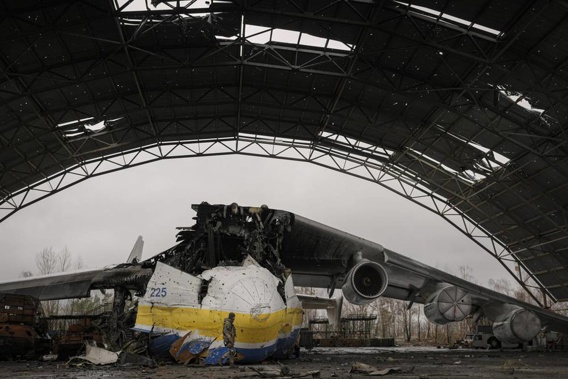
Ukraine's prosecutor-general says the bodies of 410 civilians have been removed from Kyiv-area towns that were recently retaken from Russian troops.
Iryna Venediktova says on Facebook that the bodies were recovered Friday, Saturday and Sunday. She says 140 of them have undergone examination by prosecutors and other specialists.
Ukrainian Deputy Prime Minister Iryna Vereshchuk says the mayor of the village of Motyzhyn in the Kyiv region was murdered while being held by Russian forces.
Vereshchuk adds that there are 11 mayors and community heads in Russian captivity across Ukraine.
In a video address Sunday, Ukrainian President Volodymyr Zelenskyy denounced the allegedly targeted killings of civilians in towns that the Russians occupied, calling the killers "freaks who do not know how to do otherwise". He warns that more atrocities may be revealed if Russian forces are driven out of other occupied areas.
/cloudfront-ap-southeast-2.images.arcpublishing.com/nzme/EZZP2D276UYNCZSXE35E7NQFN4.jpg)
A woman walks amid destroyed Russian tanks in Bucha, in the outskirts of Kyiv, Ukraine. Photo / AP
International leaders have condemned the reported attacks in the Kyiv-area towns after harrowing accounts from civilians and graphic images of bodies with hands tied behind their backs.
Russia's Defence Ministry has rejected the claims of atrocities against civilians in Bucha and other suburbs of Kyiv.
Russian forces bomb world's biggest airplane
In towns and cities surrounding Kyiv, signs of fierce fighting were everywhere in the wake of the Russian redeployment. Destroyed armoured vehicles from both armies lay in streets and fields along with scattered military gear.
Ukrainian troops were stationed at the entrance to Antonov Airport in the suburb of Hostomel, demonstrating control of the runway that Russia tried to storm in the first days of the war.
Inside the compound, the Mriya, one of the biggest planes ever built, lay wrecked underneath a hangar pockmarked with holes from the February attack.
"The Russians couldn't make one like it so they destroyed it," said Oleksandr Merkushev, mayor of the Kyiv suburb of Irpin.
Mriya, a 705-ton plane with a 290-foot wingspan, was reportedly destroyed in late February when Russian soldiers fought to take control of the airport.
When the war broke out, other planes left the airport. According to Ukroboronprom, the Ukrainian company in charge of the Mriya, it had been undergoing repair and could not fly out. It would take five years and US$3 billion to reconstruct it, according to the firm, which Russia should cover.
The Antonov AN-225 was believed to be the world's largest aircraft when it was completed soon before the old Soviet Union collapsed. Originally, the cargo plane was designed to ferry a Soviet space shuttle. Guinness World Records acknowledged it in 2009 for airlifting the heaviest thing ever transported by a plane: a 375,200-pound power plant generator.
/cloudfront-ap-southeast-2.images.arcpublishing.com/nzme/IJW64SCNWL5INAQ7QENA2T3TZE.jpg)
Ukrainian soldiers walk next to destroyed Russians armored vehicles in Boucha, Ukraine. Photo / AP
Russian troops fire on convoy bus evacuating patients from local hospital
The governor of the Kharkiv region says Russian troops fired on a convoy of buses that was trying to evacuate patients from a hospital that had been heavily damaged in shelling a day earlier.
/cloudfront-ap-southeast-2.images.arcpublishing.com/nzme/3GDGHNK3SZI52SE7PLH3CWAUSE.jpg)
A Ukrainian soldier looks at a damaged bridge in Bucha, on the outskirts of Kyiv, Ukraine. Photo / AP
The governor, Oleh Synyehubov, said Sunday that about 70 patients needed to be taken away from the damaged hospital in the town of Balakliya but that the buses were not able to enter the town.
He said there was preliminary information that one of the bus drivers was killed.
Balakliya is about 75 kilometers southeast of the city of Kharkiv, which has been heavily hit by Russian attacks.
Germany urges officials to halt gas supplies to Russia after alleged attacks on civilians
Germany's defence minister says European officials should talk about halting gas supplies from Russia in light of the alleged attacks on civilians in the Ukrainian town of Bucha.
Christine Lambrecht said Sunday night on German public broadcaster ARD that "there must be a reaction. Such crimes must not go unanswered".
/cloudfront-ap-southeast-2.images.arcpublishing.com/nzme/4W7DBZJAVEZTCPDJQP4GJHQCQ4.jpg)
So far, Germany and several other European governments have shied away from an immediate boycott of Russian natural gas over fears of the impact it would have on their economies.
Europe gets 40 per cent of its gas and 25 per cent of its oil from Russia, and since the war, has scrambled to set out proposals to reduce its dependency. Russia is just as reliant on Europe, with oil and gas its dominant sector and paying for government operations.
Estimates of the impact of a gas boycott or embargo on Europe vary but most involve a substantial loss of economic output.
Take your Radio, Podcasts and Music with you









